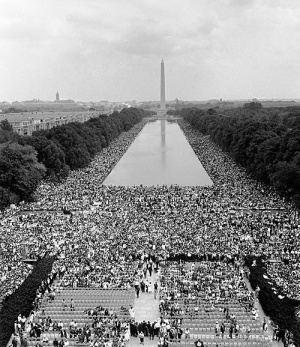Difference between revisions of "March on Washington"
(Created page with "{{event |wikipedia=https://en.wikipedia.org/wiki/March_on_Washington_for_Jobs_and_Freedom |spartacus=http://spartacus-educational.com/USAwashingtonM.htm |image=March on Washin...") |
(unstub) |
||
| (5 intermediate revisions by 2 users not shown) | |||
| Line 3: | Line 3: | ||
|spartacus=http://spartacus-educational.com/USAwashingtonM.htm | |spartacus=http://spartacus-educational.com/USAwashingtonM.htm | ||
|image=March on Washington.jpg | |image=March on Washington.jpg | ||
| + | |latitude=38°53′21″N | ||
| + | |longitude=77°03′00″W | ||
| + | |planners=A. Philip Randolph, Bayard Rustin | ||
| + | |description=A march was to advocate for the civil and economic rights of African Americans, [[Martin Luther King Jr.]] delivered his "I Have a Dream" speech. | ||
| + | |keywiki=http://www.keywiki.org/March_on_Washington | ||
| + | |locations=Washington DC, USA | ||
| + | |start=August 28, 1963 | ||
| + | |end=August 28, 1963 | ||
}} | }} | ||
| + | The '''March on Washington for Jobs and Freedom''', also known as simply the '''March on Washington''' or '''The Great March on Washington''',<ref>https://www.questia.com/googleScholar.qst?docId=5001329940</ref><ref>https://www.washingtonpost.com/wp-dyn/content/article/2010/08/24/AR2010082405003.html</ref> was held in [[Washington, D.C.]] on Wednesday, August 28, 1963.<ref>https://www.history.com/topics/black-history/march-on-washington</ref> The purpose of the march was to advocate for the civil and economic rights of [[African American]]s. At the march, final speaker Dr. [[Martin Luther King Jr.]], standing in front of the [[Lincoln Memorial]], delivered his historic "[[I Have a Dream]]" speech in which he called for an end to [[Racism in the United States|racism]].<ref>https://www.pbs.org/newshour/bb/social_issues/july-dec03/march_08-28.html</ref> | ||
| + | |||
| + | The march was organised by [[A. Philip Randolph]] and [[Bayard Rustin]], who built an alliance of civil rights, labor, and religious organizations that came together under the banner of "jobs and freedom."< Estimates of the number of participants varied from 200,000 to 300,000, but the most widely cited estimate is 250,000 people.<ref>https://web.archive.org/web/20151004044615/http://www.archives.gov/kansas-city/press/2013/13-29.html </ref> The march was one of the largest [[Demonstration (people)|political rallies]] for human rights in United States history.<ref>http://www.ourdocuments.gov/doc.php?flash=true&doc=96#</ref> [[Walter Reuther]], president of the [[United Auto Workers]], was the most integral and highest-ranking white organizer of the march.<ref>https://books.google.com/books?id=YpFWUrynUl4C&q=%22walter+reuther%22+%22most+significant%22+march+on+washington&pg=PT281</ref><ref>https://www.aft.org/periodical/american-educator/fall-2013</ref> | ||
| + | |||
| + | The march is credited with helping to pass the [[Civil Rights Act of 1964]].<ref>=https://web.archive.org/web/20130109190937/https://www.pbs.org/newshour/extra/teachers/lessonplans/history/dream2_8-20.html</ref><ref>https://thehill.com/blogs/congress-blog/civil-rights/319011--an-important-goal-of-the-1963-march-on-washington-remains-unfulfilled</ref> It preceded the [[Selma to Montgomery marches|Selma Voting Rights Movement]], when national media coverage contributed to passage of the [[Voting Rights Act of 1965]] that same year.<ref>{https://archive.org/details/storyofamericafr00wein</ref> | ||
| + | |||
| + | ==FBI== | ||
| + | In the days before August 28, the FBI called celebrity backers to inform them of the organizers' communist connections and advising them to withdraw their support. FBI agents made last minute-calls to celebrities. <i>Do you know</i>, the agents asked, <i>that many of the march's leaders are [[Communists]]? Do you know that Communists and other leftists could create chaos at the march? Do you know that it's not too late to pull out of the march? Stay away!"</i><ref>Euchner, Nobody Turn Me Around (2010), p. 57</ref> | ||
| + | |||
{{SMWDocs}} | {{SMWDocs}} | ||
==References== | ==References== | ||
{{reflist}} | {{reflist}} | ||
| − | |||
Latest revision as of 10:08, 14 April 2021
 | |
| Date | August 28, 1963 |
|---|---|
| Location | Washington DC, USA |
| Planners | A. Philip Randolph, Bayard Rustin |
| Description | A march was to advocate for the civil and economic rights of African Americans, Martin Luther King Jr. delivered his "I Have a Dream" speech. |
The March on Washington for Jobs and Freedom, also known as simply the March on Washington or The Great March on Washington,[1][2] was held in Washington, D.C. on Wednesday, August 28, 1963.[3] The purpose of the march was to advocate for the civil and economic rights of African Americans. At the march, final speaker Dr. Martin Luther King Jr., standing in front of the Lincoln Memorial, delivered his historic "I Have a Dream" speech in which he called for an end to racism.[4]
The march was organised by A. Philip Randolph and Bayard Rustin, who built an alliance of civil rights, labor, and religious organizations that came together under the banner of "jobs and freedom."< Estimates of the number of participants varied from 200,000 to 300,000, but the most widely cited estimate is 250,000 people.[5] The march was one of the largest political rallies for human rights in United States history.[6] Walter Reuther, president of the United Auto Workers, was the most integral and highest-ranking white organizer of the march.[7][8]
The march is credited with helping to pass the Civil Rights Act of 1964.[9][10] It preceded the Selma Voting Rights Movement, when national media coverage contributed to passage of the Voting Rights Act of 1965 that same year.[11]
FBI
In the days before August 28, the FBI called celebrity backers to inform them of the organizers' communist connections and advising them to withdraw their support. FBI agents made last minute-calls to celebrities. Do you know, the agents asked, that many of the march's leaders are Communists? Do you know that Communists and other leftists could create chaos at the march? Do you know that it's not too late to pull out of the march? Stay away!"[12]
References
- ↑ https://www.questia.com/googleScholar.qst?docId=5001329940
- ↑ https://www.washingtonpost.com/wp-dyn/content/article/2010/08/24/AR2010082405003.html
- ↑ https://www.history.com/topics/black-history/march-on-washington
- ↑ https://www.pbs.org/newshour/bb/social_issues/july-dec03/march_08-28.html
- ↑ https://web.archive.org/web/20151004044615/http://www.archives.gov/kansas-city/press/2013/13-29.html
- ↑ http://www.ourdocuments.gov/doc.php?flash=true&doc=96#
- ↑ https://books.google.com/books?id=YpFWUrynUl4C&q=%22walter+reuther%22+%22most+significant%22+march+on+washington&pg=PT281
- ↑ https://www.aft.org/periodical/american-educator/fall-2013
- ↑ =https://web.archive.org/web/20130109190937/https://www.pbs.org/newshour/extra/teachers/lessonplans/history/dream2_8-20.html
- ↑ https://thehill.com/blogs/congress-blog/civil-rights/319011--an-important-goal-of-the-1963-march-on-washington-remains-unfulfilled
- ↑ {https://archive.org/details/storyofamericafr00wein
- ↑ Euchner, Nobody Turn Me Around (2010), p. 57